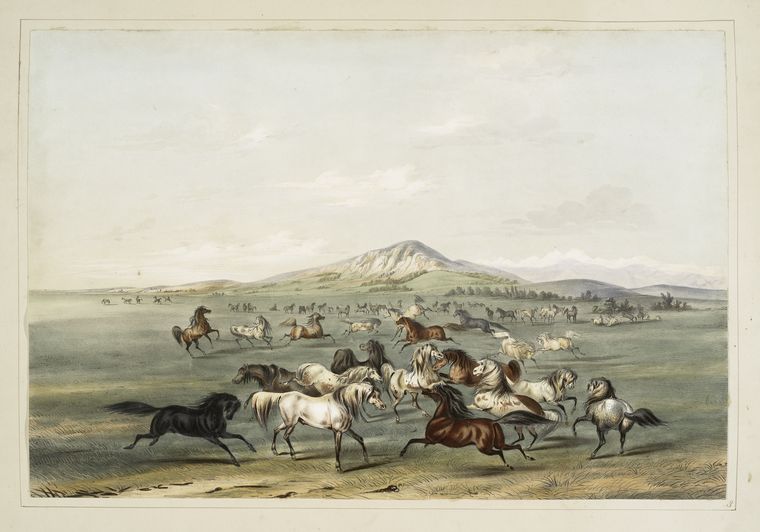Children's Literature @ NYPL
Booktalking "Wild Horse Scientists" by Kay Frydenborg
 Horse reproduction! I never thought that I would learn so much about this subject by reading a book about wild horse scientists, but I guess that it makes sense. After all, managing the numbers of wild horses on islands, especially publicly protected land in which predators are few and far between, is a challenge.
Horse reproduction! I never thought that I would learn so much about this subject by reading a book about wild horse scientists, but I guess that it makes sense. After all, managing the numbers of wild horses on islands, especially publicly protected land in which predators are few and far between, is a challenge.
And what to do with the excess horses that appear? No one wants to see them killed. Luckily, there are programs to promote the adoption of these horses. One such program on the island is managed by a horse trainer that pairs kids with foals to help the horses trust humans and learn basic ground manners before being adopted. Sounds like fun for the horses and kids, with proper supervision and training, of course.
Thanks to the National Park Service and wildlife biologists who have devoted their lives to protecting the social lives of the horses, they can live their lives in piece. No herds are torn apart by random removal of excess horses. The horses manage to maintain most of their wildness, and they live healthier lives. Before receiving the contraceptive vaccines, mares were living an average of 7 or 8 years. Now, without foals to feed, winters are easier for them. Besides, each mare is allowed to have one foal before receiving birth control, to keep the herd alive and well!
Wild Horse Scientists by Kay Frydenborg, 2012

Reproduction: Kirkpatrick has a doctorate in wildlife reproductive physiology, and he worked for over two decades to develop an effective horse contraceptive vaccine that can be administered by darting the horses. It was a trial and error process, but it has caused the wild horse population to slowly but steadily decline. I was unaware prior to reading this book that contraceptive vaccines were used on wild horses. It is a fascinating idea.
 At the annual "pony penning" event in Assateague, the wild horses are penned and the foals are offered for adoption. Unfortunately, the mares whose foals were removed are more likely to get pregnant again sooner than if they had kept the foals. Marguerite Henry wrote the novel Misty of Chincoteague in 1947 about the Assateague horses. Many people mistakenly thought that the horses lived on Chincoteague Island, even though they are actually from the Assateague Island.
At the annual "pony penning" event in Assateague, the wild horses are penned and the foals are offered for adoption. Unfortunately, the mares whose foals were removed are more likely to get pregnant again sooner than if they had kept the foals. Marguerite Henry wrote the novel Misty of Chincoteague in 1947 about the Assateague horses. Many people mistakenly thought that the horses lived on Chincoteague Island, even though they are actually from the Assateague Island.
Dangers: Flies and other insects plague the horses, but luckily some of them have formed symbiotic relationships with birds called cattle egrets, who pluck the insects from the horses' backs for a snack. Horses face other dangers on the Assateague Island. The publication of Misty of Chincoteague made watching the horses more popular. Consequently, some of the horses have lost their fear of people, and they engage in dicey activities like roaming parking lots looking for handouts from visitors, and they often graze immediately adjacent to roadways, which puts people and horses in danger. Luckily, members of the "pony patrol" educate visitors about the horses to prevent people from getting kicked or bitten and to keep the horses safe.
- Assateague's Wild Horses
- Bureau of Land Management
- International Society for the Protection of Wild Mustangs and Burros
- National Mustang Association
- National Wild Horse Association
- Wild Horse Education
- Wild Horse Observers Association
- Books by Kay Frydenborg
Read E-Books with SimplyE
 With your library card, it's easier than ever to choose from more than 300,000 e-books on SimplyE, The New York Public Library's free e-reader app. Gain access to digital resources for all ages, including e-books, audiobooks, databases, and more.
With your library card, it's easier than ever to choose from more than 300,000 e-books on SimplyE, The New York Public Library's free e-reader app. Gain access to digital resources for all ages, including e-books, audiobooks, databases, and more.
If you don’t have an NYPL library card, New York State residents can apply for a digital card online or through SimplyE (available on the App Store or Google Play).
Need more help? Read our guide to using SimplyE.